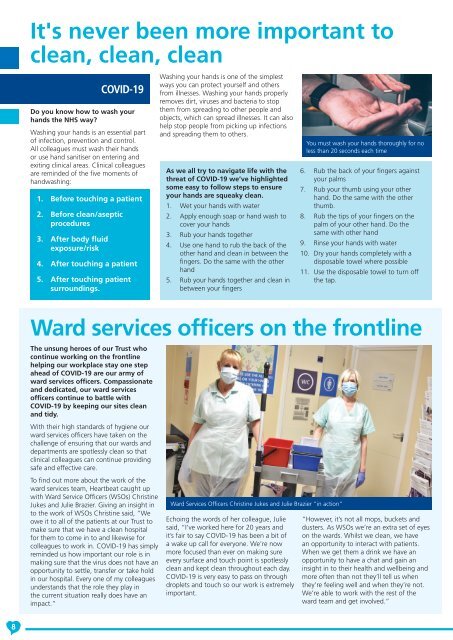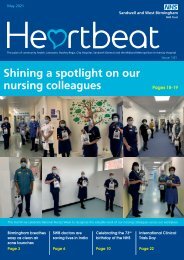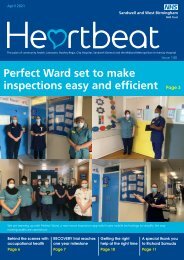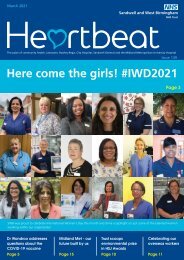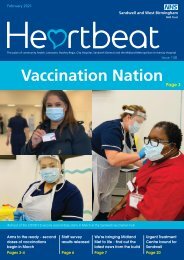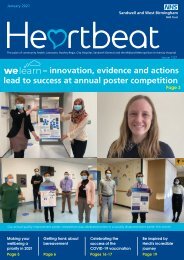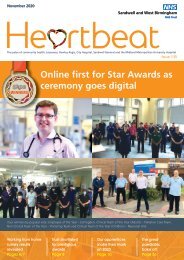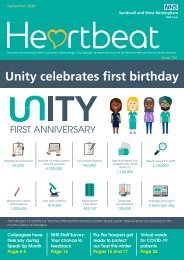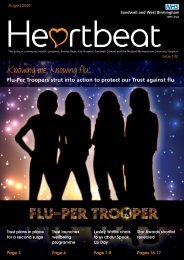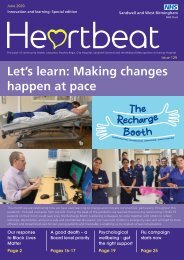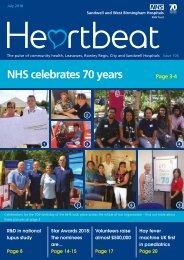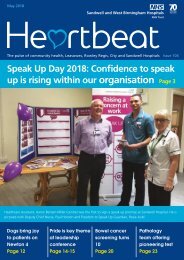Heartbeat March 2020
Create successful ePaper yourself
Turn your PDF publications into a flip-book with our unique Google optimized e-Paper software.
It's never been more important to<br />
clean, clean, clean<br />
COVID-19<br />
Do you know how to wash your<br />
hands the NHS way?<br />
Washing your hands is an essential part<br />
of infection, prevention and control.<br />
All colleagues must wash their hands<br />
or use hand sanitiser on entering and<br />
exiting clinical areas. Clinical colleagues<br />
are reminded of the five moments of<br />
handwashing:<br />
1. Before touching a patient<br />
2. Before clean/aseptic<br />
procedures<br />
3. After body fluid<br />
exposure/risk<br />
4. After touching a patient<br />
5. After touching patient<br />
surroundings.<br />
Washing your hands is one of the simplest<br />
ways you can protect yourself and others<br />
from illnesses. Washing your hands properly<br />
removes dirt, viruses and bacteria to stop<br />
them from spreading to other people and<br />
objects, which can spread illnesses. It can also<br />
help stop people from picking up infections<br />
and spreading them to others.<br />
As we all try to navigate life with the<br />
threat of COVID-19 we’ve highlighted<br />
some easy to follow steps to ensure<br />
your hands are squeaky clean.<br />
1. Wet your hands with water<br />
2. Apply enough soap or hand wash to<br />
cover your hands<br />
3. Rub your hands together<br />
4. Use one hand to rub the back of the<br />
other hand and clean in between the<br />
fingers. Do the same with the other<br />
hand<br />
5. Rub your hands together and clean in<br />
between your fingers<br />
You must wash your hands thoroughly for no<br />
less than 20 seconds each time<br />
6. Rub the back of your fingers against<br />
your palms<br />
7. Rub your thumb using your other<br />
hand. Do the same with the other<br />
thumb.<br />
8. Rub the tips of your fingers on the<br />
palm of your other hand. Do the<br />
same with other hand<br />
9. Rinse your hands with water<br />
10. Dry your hands completely with a<br />
disposable towel where possible<br />
11. Use the disposable towel to turn off<br />
the tap.<br />
Ward services officers on the frontline<br />
The unsung heroes of our Trust who<br />
continue working on the frontline<br />
helping our workplace stay one step<br />
ahead of COVID-19 are our army of<br />
ward services officers. Compassionate<br />
and dedicated, our ward services<br />
officers continue to battle with<br />
COVID-19 by keeping our sites clean<br />
and tidy.<br />
With their high standards of hygiene our<br />
ward services officers have taken on the<br />
challenge of ensuring that our wards and<br />
departments are spotlessly clean so that<br />
clinical colleagues can continue providing<br />
safe and effective care.<br />
To find out more about the work of the<br />
ward services team, <strong>Heartbeat</strong> caught up<br />
with Ward Service Officers (WSOs) Christine<br />
Jukes and Julie Brazier. Giving an insight in<br />
to the work of WSOs Christine said, “We<br />
owe it to all of the patients at our Trust to<br />
make sure that we have a clean hospital<br />
for them to come in to and likewise for<br />
colleagues to work in. COVID-19 has simply<br />
reminded us how important our role is in<br />
making sure that the virus does not have an<br />
opportunity to settle, transfer or take hold<br />
in our hospital. Every one of my colleagues<br />
understands that the role they play in<br />
the current situation really does have an<br />
impact.”<br />
Ward Services Officers Christine Jukes and Julie Brazier "in action"<br />
Echoing the words of her colleague, Julie<br />
said, “I’ve worked here for 20 years and<br />
it’s fair to say COVID-19 has been a bit of<br />
a wake up call for everyone. We're now<br />
more focused than ever on making sure<br />
every surface and touch point is spotlessly<br />
clean and kept clean throughout each day.<br />
COVID-19 is very easy to pass on through<br />
droplets and touch so our work is extremely<br />
important.<br />
“However, it’s not all mops, buckets and<br />
dusters. As WSOs we’re an extra set of eyes<br />
on the wards. Whilst we clean, we have<br />
an opportunity to interact with patients.<br />
When we get them a drink we have an<br />
opportunity to have a chat and gain an<br />
insight in to their health and wellbeing and<br />
more often than not they’ll tell us when<br />
they’re feeling well and when they’re not.<br />
We’re able to work with the rest of the<br />
ward team and get involved.”<br />
8


